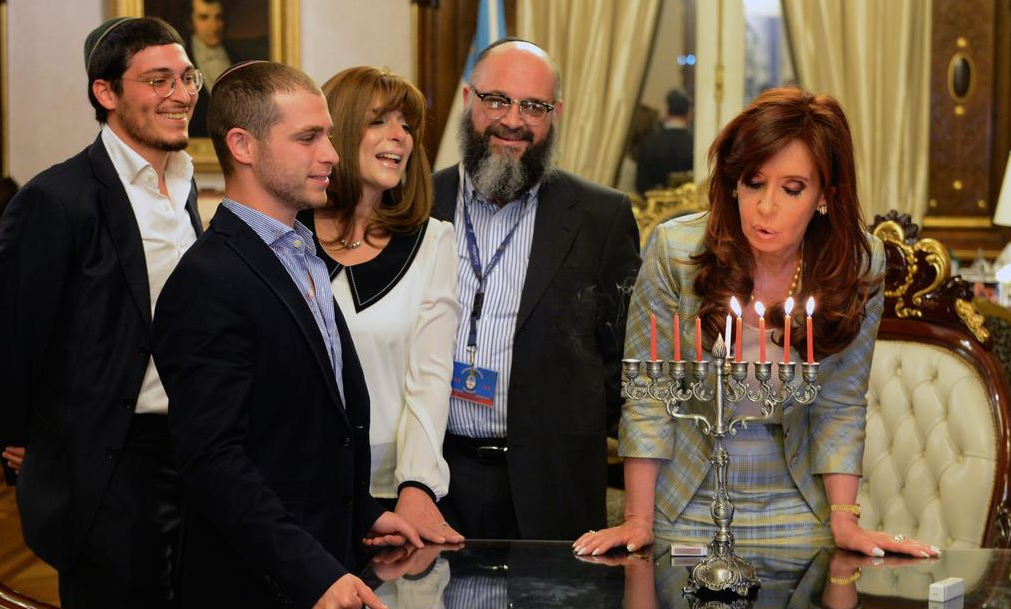Last week, JTA published an unusual item about a werewolf legend that generated headlines worldwide. The item was about Yair Tawil, the first Jewish man adopted as a godson by Argentina’s president, Cristina Fernandez de Kirchner.
The adoption took place under a longstanding custom that presidents adopt the seventh son (born to a family with no daughters in between) to counter a legend that once led families to put their seventh sons up for adoption, abandon them or even kill them out of fear they would become werewolves. The custom originated in the early 20th century and was made the law of the land in the 1970s (in our original report, we erred in stating the law dates from the 1920s).
Until 2009, the law had been restricted to Catholics. Tawil was the first Jew adopted under the law, though by the time of his adoption he was already a grown man. Typically, the law is applied to babies.
Four days after our piece appeared, the U.K. Guardian challenged our report, which by then had been picked up by numerous other news outlets. The Guardian quoted Argentine historian Daniel Balmaceda, who asserted that there was no connection between the presidential custom and the myth of the lobizon, a werewolf legend popular among Argentine cowboys. The piece further suggested that media outlets were quick to report a story suggesting the Argentine president believes in werewolves because of a tendency to view Latin American leaders as “erratic.”
If we are to trust Balmaceda, we would need to believe that two entirely unconnected customs relating to the seventh son coexisted in Argentina — one concerning werewolves, and one concerning presidential adoptions — and that the former had absolutely no bearing on the latter. This is almost certainly not the case.
The roots of presidential adoption in Argentina date to 1907, when a son was born to Enrique Brost and Apolonia Holmann in the town of Coronel Pringles, several hours south of Buenos Aires. Brost and Holmann were immigrants from Russia, where there was a tradition of the czar adopting seventh sons to break a spell under which they would become werewolves. The couple asked the president at the time, Jose Figueroa Alcorta, to adopt their son Jose Brost, and the president agreed.
Horacio Vazquez Rial, an Argentine historian who later moved to Spain, described in detail the Russian origins of the werewolf myth and the tradition of czarist protection in the prologue to his unpublished book, “The Last Werewolf.” The German-born Brost and Holmann, Vazquez Rial wrote, were “very marked by Russian culture.” Finding themselves in a country without a czar, however, they turned to the president to protect their son.
The website of the municipality of Coronel Pringles also claims that Brost and Holmann sought the protection of the president because of the werewolf legend.
Over the years, the adoption custom became entrenched and, in 1973, was made explicit in a presidential decree by Argentine President Juan Peron. The following year, after Peron’s death, his wife, Isabel, extended the law to girls.
It’s likely that by the 1970s few people in Argentina still believed in the werewolf legend, and Peron’s gesture probably was intended to achieve other aims. Vazquez Rial himself gives some hint of this by noting that Peron, a Catholic, was not superstitious and may have acted with no knowledge of the origins of the custom. And though the law remains on the books, and was even extended in 2009 to permit non-Catholics to benefit (in addition to symbolic adoption, the law provides for a medal and scholarship funds), it would be going too far to assert that Kirchner extended the honor to Tawil because she genuinely believed he would become a werewolf otherwise.
“It has become a symbol of the state’s patronage of the national population, as well as a measure to extend a helping hand to large families,” Raanan Rein, a professor of Latin American and Spanish history at Tel Aviv University, told JTA. “President Cristina Fernandez de Kirchner’s decision to bestow the honor on non-Christian children as well is a reflection of Peronist efforts to include all ethnic groups in the Argentine nation, as well as a growing recognition of Argentina’s multi-cultural character.”
Nevertheless, the link between the law, the adoption custom and the werewolf legend are practically undeniable and are widely recognized in Argentina. The werewolf roots of the law are mentioned regularly in Argentine media (see here, here, here, here and here), including in coverage of adoptions before Tawil.
In 2010, Argentine legislator Ana Maria Corradi de Beltran, who had been involved in efforts to expand the Peron law to cover Argentines of all faiths and hails from the president’s ruling party, wrote: “Where did this law come from? It comes from the myth of the werewolf in Argentina, which was called the myth of lobizon. This came from the Russia of the czars, where the myth that the seventh son of a family of seven sons would be a werewolf.”
JTA has documented Jewish history in real-time for over a century. Keep our journalism strong by joining us in supporting independent, award-winning reporting.






